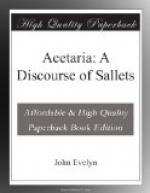38. Mint, Mentha; the Angustifolia Spicata, Spear-Mint; dry and warm, very fragrant, a little press’d, is friendly to the weak Stomach, and powerful against all Nervous Crudities: The gentler Tops of the Orange-Mint, enter well into our Composition, or are grateful alone (as are also the other sorts) with the Juice of Orange, and a little Sugar.
39. Mushroms, Fungi; By the [27]Orator call’d Terrae, by Porphyry Deorum filii, without Seed (as produc’d by the Midwifry of Autumnal Thunder-Storms, portending the Mischief they cause) by the French, Champignons, with all the Species of the Boletus, &c. for being, as some hold, neither Root, Herb, Flower, nor Fruit, nor to be eaten crude; should be therefore banish’d entry into our Sallet, were I to order the Composition; however so highly contended for by many, as the very principal and top of all the rest; whilst I think them tolerable only (at least in this Climate) if being fresh and skilfully chosen, they are accommodated with the nicest Care and Circumspection; generally reported to have something malignant and noxious in them: Nor without cause; from the many sad Examples, frequent Mischiefs, and funest Accidents they have produc’d, not only to particular Persons, but whole Families: Exalted indeed they were to the second Course of the Caesarian Tables, with the noble Title [Greek: Broma theon], a Dainty fit for the Gods alone; to whom they sent the Emperor [28]_Claudius_, as they have many since, to the other World. But he that reads how [29]_Seneca_ deplores his lost Friend, that brave Commander Annaeus Serenus, and several other gallant Persons with him, who all of them perish’d at the same Repast; would be apt to ask with the [30]_Naturalist_ (speaking of this suspicious Dainty) Quae voluptas tanta ancipitis cibi? and who indeed would hazard it? So true is that of the Poet; He that eats Mushroms, many time Nil amplius edit, eats no more perhaps all his Life after. What other deterring Epithets are given for our Caution, [Greek: Bare pnigoenta muketon], heavy and choaking. (Athenaeus reporting of the Poet Euripides’s, finding a Woman and her three Children strangl’d by eating of them) one would think sufficient warning.
Among these comes in the Fungus Reticularis, to be found about London, as at Fulham and other places; whilst at no small charge we send for them into France; as we also do for Trufles, Pig-nuts, and other subterraneous Tubera, which in Italy they fry in Oyl, and eat with Pepper: They are commonly discovered by a Nasute Swine purposely brought up; being of a Chessnut Colour, and heady Smell, and not seldom found in England, particularly in a Park of my Lord Cotton’s at Rushton or




